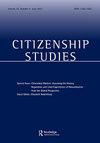国家与公民的共生:严复对中国公民观念的转变
IF 1.9
3区 社会学
Q3 POLITICAL SCIENCE
引用次数: 0
摘要
本文通过考察中国近代知识分子严复(1854-1921)的社会政治思想,追溯帝制中国的公民权观念及其近代转变。它首先分析了中国帝国历史上儒家-法家的统治者-被统治者的关系,认为它的特点是四个不同社会群体之间的等级秩序,中国人被划分并集体所属。在描述了严复在晚清中国扮演重要角色的历史背景之后,文章进一步探讨了严复在中西政治思想文化融合的基础上对中国公民观念的转变。它引入了“国家与公民共生”的概念来阐述阎对中国公民模式的看法。这种共生关系的特点是:(1)认同个人作为公民的自由和国家的民主;(二)公民与国家相互依存、互惠互利。本文章由计算机程序翻译,如有差异,请以英文原文为准。
The symbiosis of state and citizens: Yan Fu’s transformation of Chinese citizenship idea
ABSTRACT The article traces the Chinese conception of citizenship in imperial China and its modern transformation by looking into the socio-political thought of modern Chinese intellectual Yan Fu (1854–1921). It begins with an analysis of the Confucian-Legalist ruler-ruled relationship in imperial Chinese history, arguing that it is characterized by a hierarchical order among four different social groups to which Chinese are divided and collectively belong. After depicting the historical context of late Qing China in which Yan plays a vital role, the article further discusses Yan Fu’s transformation of Chinese citizenship idea based on cultural integration between Western and Chinese political thought. It introduces the idea of ‘symbiosis of the state and citizens’ to illustrate Yan’s vision of the Chinese citizenship model. The symbiotic relationship is characterized by 1), the endorsement of the liberty of individual min as citizens and the democracy of the state; 2), the interdependence and reciprocity between citizens and the Chinese state.
求助全文
通过发布文献求助,成功后即可免费获取论文全文。
去求助
来源期刊

Citizenship Studies
POLITICAL SCIENCE-
CiteScore
3.60
自引率
11.10%
发文量
85
期刊介绍:
Citizenship Studies publishes internationally recognised scholarly work on contemporary issues in citizenship, human rights and democratic processes from an interdisciplinary perspective covering the fields of politics, sociology, history and cultural studies. It seeks to lead an international debate on the academic analysis of citizenship, and also aims to cross the division between internal and academic and external public debate. The journal focuses on debates that move beyond conventional notions of citizenship, and treats citizenship as a strategic concept that is central in the analysis of identity, participation, empowerment, human rights and the public interest.
 求助内容:
求助内容: 应助结果提醒方式:
应助结果提醒方式:


